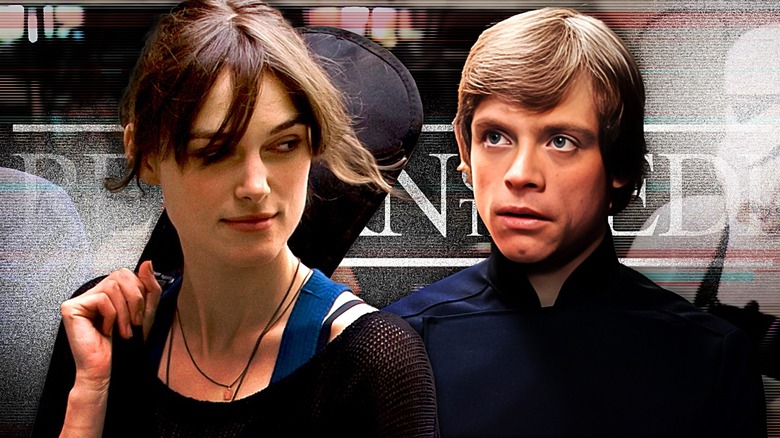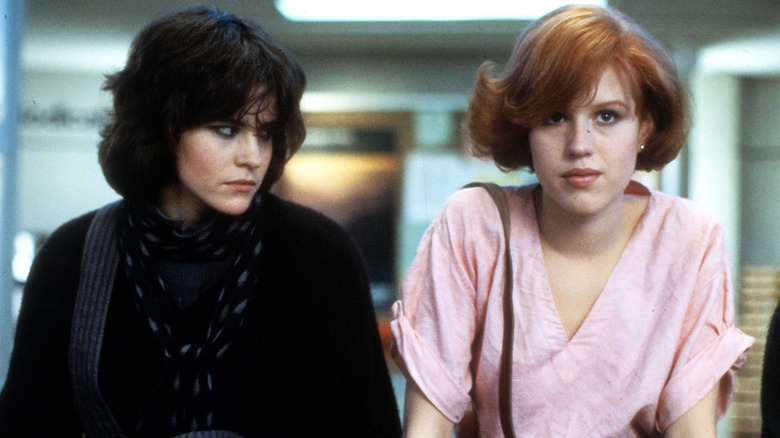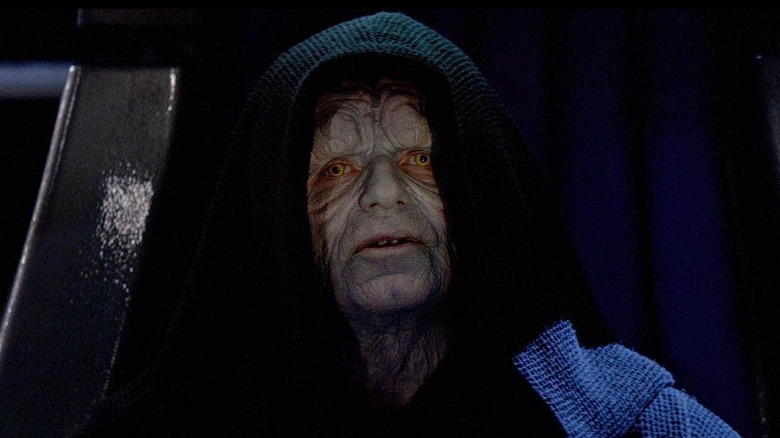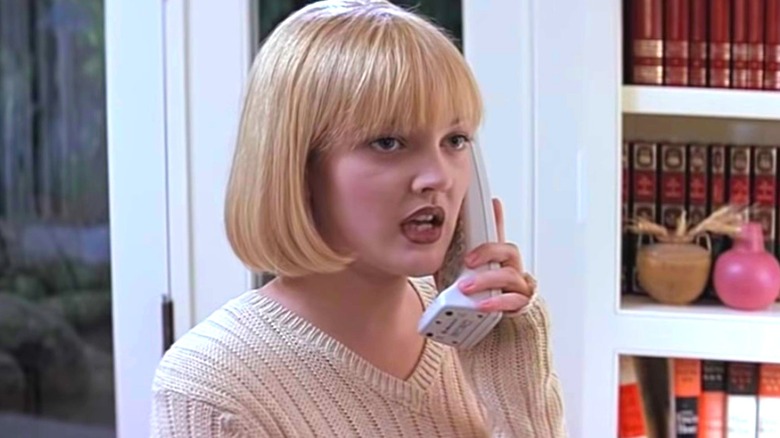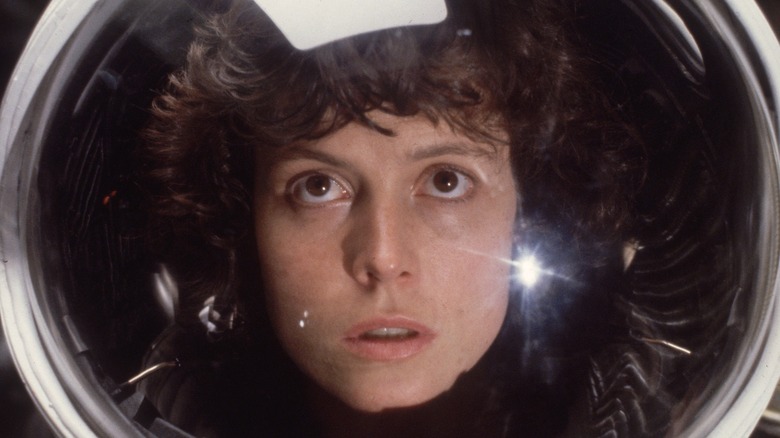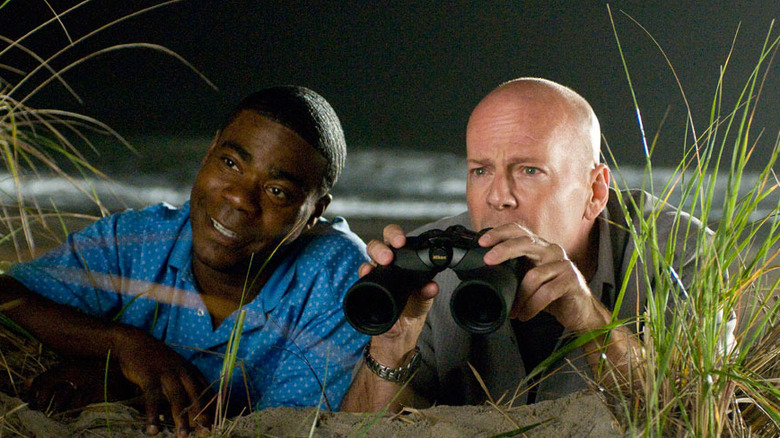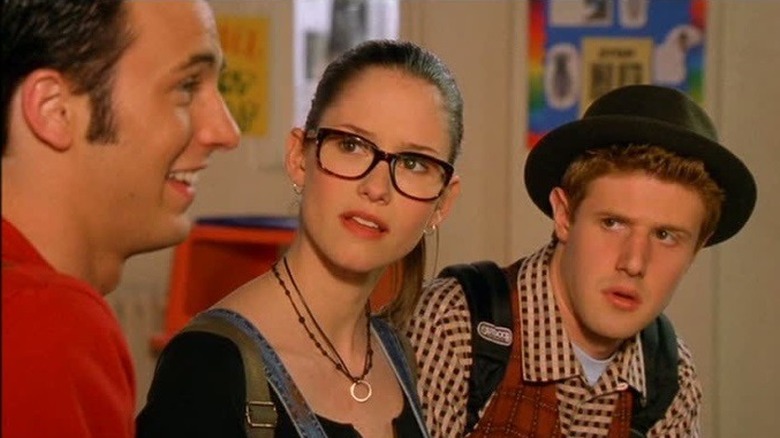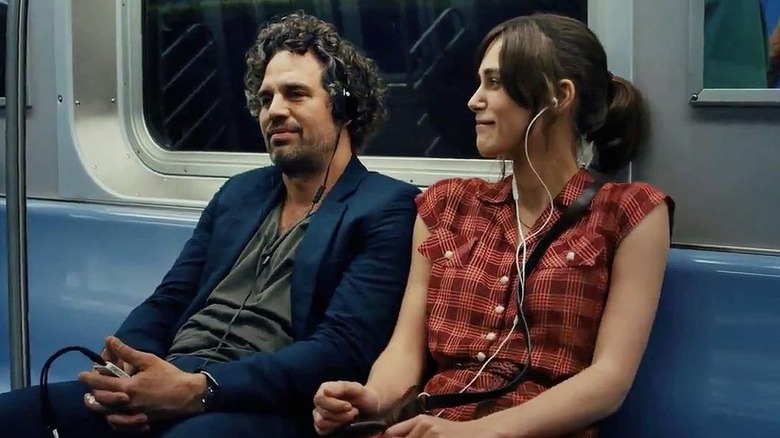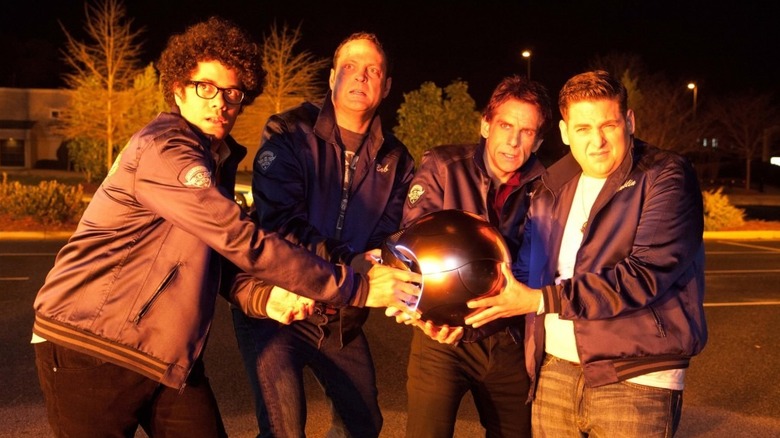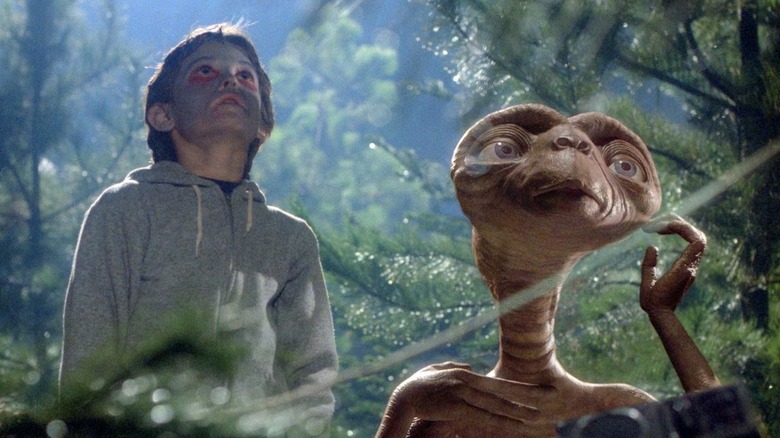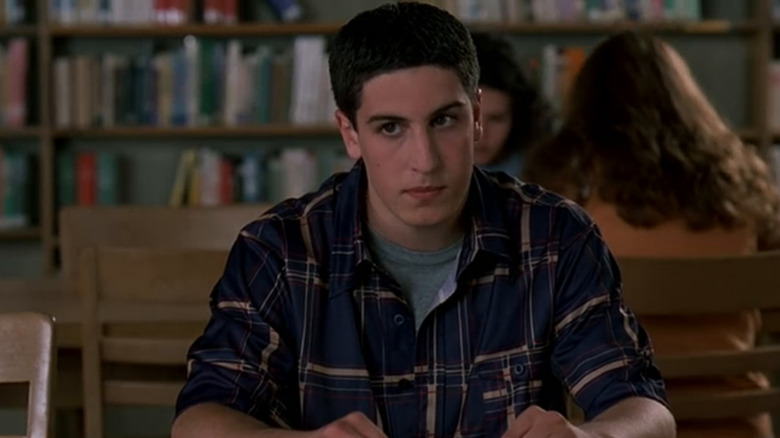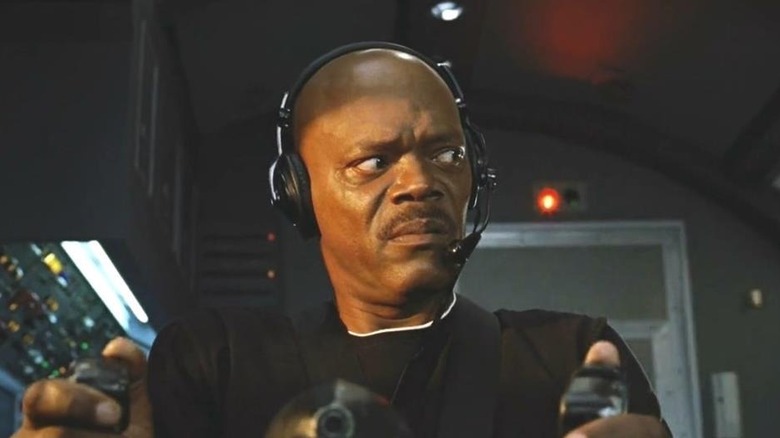Movies That Started Under A Different Title
What's in a name? A lot, actually, when it comes to movies. In addition to obvious elements like an exciting trailer and well-known talent being attached, a compelling title can go a long way in selling a movie to the masses. It has to look good splashed across billboards and on the sides of buses, and it needs to hook people enough to want to learn more about the film. With all of that in mind, it shouldn't come as a surprise that a lot of thought is put into naming movies.
In fact, a lot of movies go through several different titles during production before the final name is decided upon. Whether it's a generic working title that was always meant to be changed, or a name that seemed like the right fit at first but was eventually changed for various reasons, the title on the first draft of a movie's script is very often not the same one that greets moviegoers when they sit down to watch the finished product. To be clear, these aren't movies that were forced to change their title after release. Rather, the films in this feature experienced their respective name changes during development and before they were finally released to the general public.
The Breakfast Club
Andrew McCarthy's 2024 Hulu documentary "Brats" shed some light on the era of the so-called Brat Pack, the effect that the label had on those that were part of it, and what they look like today. There really didn't seem to be particularly rigid guidelines as to whom was a Brat Pack member, though it seems like the epicenter of it all was "The Breakfast Club" and "St. Elmo's Fire." What's interesting is that, if filmmaker John Hughes — who made more Brat Pack-adjacent films than anyone else — would have had his way, we'd be talking about "The Lunch Bunch" instead of "The Breakfast Club."
Despite sounding like a cartoon about kid superheroes with food-based abilities, "The Lunch Bunch" was indeed the original title of Hughes's iconic 1985 coming-of-age drama about a group of seemingly disparate teens finding common ground during Saturday detention. What's especially odd is that Hughes already had another, better food-adjacent name for a detention group from his own past. A friend of his who went to a different high school was part of a detention class called — you guessed it — the Breakfast Club.
It's not clear when he suddenly remembered that bit of information, but luckily he did before it was too late — although it's fun to imagine an accompanying pop song called "The Lunch Bunch" becoming a big hit in 1985.
Star Wars: Episode VI -- Return of the Jedi
While few people other than George Lucas himself had high hopes for the original "Star Wars" movie, the franchise was a full-blown pop culture phenomenon by the time production was underway for the third — or is that sixth? — installment of the series. It's for that reason that "Star Wars: Episode VI — Return of the Jedi" got the first of what would end up being two different titles before landing on the final name. To hide the true nature of the movie, it was given the vague title "Blue Harvest," and members of the crew even wore caps bearing that logo during production. And, yes, that's why the Season 6 premiere of "Family Guy" — a "Star Wars" parody — was named as such.
But that wouldn't be the only thing that "Return of the Jedi" was called before the official name was finalized. For much of the rest of the production, the subtitle was "Revenge of the Jedi." This got so far along that posters were made and even an early trailer was released bearing that title. But Lucas ultimately decided that the concept of revenge is beneath a Jedi's principles, and so "Revenge" became "Return." Of course, this paved the way for the perfect title for the third installment of the prequel trilogy — "Revenge of the Sith."
Scream
Few movies released in the last 30 years deserve more credit for revitalizing a stale genre than "Scream." Horror movies never really went away, but they were definitely in one of their nadirs leading up to the 1996 release of "Scream." More importantly, the slasher subgenre had largely been left behind after the '80s. Much of why "Scream" was so successful and got so much attention was due to its meta moments and the way it poked fun at the long-held tropes of scary movies, while simultaneously leaning into those tropes. So what better title for a scary movie about scary movies then, well, "Scary Movie"?
Sure enough, screenwriter Kevin Williamson's original script for "Scream" was titled "Scary Movie." It entered production under that moniker, and like "Return of the Jedi," the crew had already been gifted a bunch of swag branded with the movie's original name. But the studio didn't like "Scary Movie" and changed the title to "Scream" instead. The general consensus among the crew was that they hated the new name at first, but eventually came around to appreciating it. And also echoing "Return of the Jedi" and "Family Guy," the Wayans brothers would help themselves to the original production title for their eventual horror film parody — calling it "Scary Movie."
Hancock
These days, you can't throw an Infinity Stone without hitting a movie or TV show built around the basic premise of "What if a superhero was also a huge jerk?" But in 2008, when "Hancock" was released, it was still a somewhat novel concept. The basic premise is the titular character is essentially godlike in both strength and invulnerability — but he's also not a particularly nice guy. Part of the fun is that he's portrayed by Will Smith, who at the time was still mostly known for portraying wholesome, do-gooder types and was playing against type.
Unfortunately, "Hancock" falls apart about halfway through, with multiple plot twists that go too far and take the movie into bizarre territory involving amnesiac immortals who are thousands of years old. But it's nothing compared to what was originally intended for the character. A major aspect of John Hancock in the original version of the script was that he couldn't finish the act of sex with a woman, as doing so would literally kill her. To go along with that absolutely bizarre character trait, the original title was "Tonight He Comes."
How writer and future "Breaking Bad" creator Vince Gilligan thought any of that was going to work for a major studio film is anyone's guess. But cooler heads prevailed, and that part of the story was dropped, along with the title, which was changed first to "John Hancock" and eventually just "Hancock."
Alien
The brilliance of the title of Ridley Scott's 1979 sci-fi/horror masterpiece lies in its simplicity — "Alien." It not only describes the literal alien being that serves as the movie's main antagonist, but the various other uses and definitions of the word also come into play in multiple ways throughout the film. Its a title so perfect that, when it came time for a sequel, new director James Cameron simply added an "s" to it. Without digging into the subtext of what "Alien" could truly mean, it's easy to write it off as an example of a generic working title that just never got changed.
In fact, "Alien" had previously been called by two other names as it went through its various stages of production. The original story treatment that would serve as the basis for the movie was titled "Memory," and didn't actually feature an alien at all. Once the movie's production got underway, it was then known as "Star Beast," acknowledging the menacing intergalactic creature that was now the film's big bad. Eventually, that too was axed in favor of the much simpler, and far more evocative, "Alien." So in an alternate universe, James Cameron could have followed up "The Terminator" with a movie called "Star Beasts."
Cop Out
From his early days as one of the filmmakers behind the indie boom of the mid-1990s, Kevin Smith established himself as a writer-director. His first eight movies — from 1994's "Clerks" to 2006's "Zack and Miri Make a Porno" — indeed all saw him serve both roles (among others). At that point, Smith took a stab at being a studio director for hire when he took on his first directorial project for a script he didn't write. 2010's "Cop Out," starring Bruce Willis and Tracy Morgan, would also be the last time he directed a movie he didn't write.
In addition to getting a chance to work with one of his heroes — though he and Willis would eventually feud during production — Smith also took on the buddy cop comedy in part because of its original title, "A Couple of Dicks." Though the name harkened back to the era of classic detective mysteries, which often saw the characters referred to as "private dicks," TV networks weren't too keen on advertising a movie with such a dirty-sounding title. After the studio was informed that the movie could only be advertised on television after 9pm, a name change was inevitable.
Smith contemplated quitting if the name was changed, but he didn't go through with it. At first, the proposed new name was "A Couple of Cops," but bringing things back to pun territory, the powers-that-be ultimately settled on "Cop Out."
Not Another Teen Movie
While various sources can't quite settle on what the original name was going to be for "Scary Movie," they all agree that it's some variation of "Scream If You Know What I Did Last Halloween" — with some versions adding a few more horror movie titles into the mix. This is a callback to the Wayans brothers' previous genre spoof, "Don't Be a Menace to South Central While Drinking Your Juice in the Hood," which cleverly combined the names of the various '90s hood films that it was parodying.
Though that tradition ended with "Don't Be A Menace..." after "Scream If You Know..." wasn't actually used for "Scary Movie," it was nearly revived for 2001's "Not Another Teen Movie." Following suit of the aforementioned films by spoofing a specific movie genre — in this case, coming-of-age teen dramedies from the previous two decades — "Teen Movie" nearly got its own wordy title incorporating the names of the movies it was skewering. In this case, it would have been "10 Things I Hate About Clueless Road Trips When I Can't Hardly Wait to Be Kissed."
Sadly, like "Scary Movie," that title was abandoned in favor of a name that simply states the genre being parodied, followed by the word "movie." All we can do now is speculate as to what films like "Date Movie," "Epic Movie," "Superhero Movie," and "Disaster Movie" might have been called if the original naming tradition had been kept alive.
Begin Again
Though the names of all the movies in this article were changed before general release, that doesn't mean that none of them were seen by audiences under their original titles. Such was the case with "Begin Again," the 2013 musical comedy-drama starring Mark Ruffalo, Keira Knightley, and Maroon 5 front man Adam Levine in his film acting debut. Though the title was already "Begin Again" when the movie saw its official theatrical release, it was called something very different — and a bit more of a mouthful — when it was making the film festival rounds looking for distribution.
Owing to how much of the Judd Apatow-produced film is based around the two main characters collaborating on music and their shared love of music, "Begin Again" doesn't necessarily make that obvious. But the movie's original title, "Can a Song Save Your Life?", did exactly that. It's definitely a cute and attention-grabbing title, but it scored poorly with test audiences. By the time it was purchased by The Weinstein Company for theatrical distribution, its new and final name — "Begin Again" — was already in place.
The Watch
There have been many examples of movies that had to make a major change due to a tragic event that occurred sometime between production and release. For instance, numerous movies had to make alterations as a result of the 9/11 terrorist attacks. One of the most notable examples was the scene of a helicopter being caught in a web between the Twin Towers in 2002's "Spider-Man" — prominently used in the movie's first teaser trailer — being pulled from all subsequent marketing and the movie itself.
As for the 2012 sci-fi comedy "The Watch," its original name lost its luster following the shooting of Trayvon Martin by George Zimmerman, who was a member of the neighborhood watch for the area Martin was walking through at the time of the incident. With the attention and controversy that the case was getting, it wasn't exactly an ideal time to release a movie — and a comedy, no less — with the title "Neighborhood Watch."
In addition to shortening the name to just "The Watch," 20th Century Fox also changed the focus of the movie's commercials and trailers to be more about the extraterrestrial presence in the movie than the neighborhood watch members — played by Ben Stiller, Jonah Hill, Vince Vaughn, and Richard Ayoade — battling them.
E.T. the Extra-Terrestrial
Despite the repetitive nature of the title, it's hard to imagine "E.T. the Extra-Terrestrial" being called anything else. It describes both what the movie is about and is also the de facto name of the film's main non-human lead. It was Steven Spielberg's first real family film, and proved that he could apply his talents at crafting adventure stories with a sci-fi bent to heartwarming — and also heartbreaking — films both starring and aimed at kids. Yet the project went through several titles before its release.
The film was originally called "E.T. and Me," but studio execs weren't happy at first with the screenplay for the proposed movie, which may have led Spielberg to change the somewhat Disney-esque title. The shooting title for "E.T." was actually "A Boy's Life," which Spielberg used to preserve the film's secrecy while production was underway. Some also consider "Night Skies" to be an early alternate title, owing to the fact that it was the name of a previous, much darker alien contact story that Spielberg had been developing before pivoting to "E.T." Some story elements intended for "Night Skies" ultimately got used for "E.T.," with other aspects put into the Spielberg-produced "Poltergeist" and "Gremlins."
American Pie
It's impossible to imagine that "American Pie" wasn't called that from the very moment that it was conceived. It has a brilliant dual meaning that evokes all-American innocence, while also simultaneously referring to what main character Jim (Jason Biggs) ends up doing to a literal pie during the movie. And there's also the ease with which the "American" part of the title lent itself to sequel names, including "American Wedding" and "American Reunion."
"Unfitted Teenage Sex Comedy Which Can Be Made for Under $10 Million That Studio Readers Will Most Likely Hate but I Think You Will Love" just doesn't have the same ring to it. But that's what the sequels to "American Pie" might have grappled with if the script that Adam Herz left on the desk of various Hollywood executives to sell them on his raunchy romp had kept the title that accompanied it. It was clearly never intended to be the movie's real title, but it's still what it was called when it got its inevitable greenlight. Even so, "American Pie" wasn't its first real title — that honor belongs to "East Great Falls High," named after the fictional town the movie takes place in.
It's also worth noting that several websites have claimed that "American Pie" was also known as "Comfort Food" at some point during production, but there isn't any credible sourcing to back this up.
Snakes on a Plane
To be fair, this one is a little bit of a cheat. That's because "Snakes on a Plane" was actually meant to just be the on-the-nose working title of the campy 2006 action romp, and the intention was to eventually release the movie as "Pacific Flight 121." It was actually star Samuel L. Jackson who vetoed the change, and is the reason why the movie did in fact end up being called "Snakes on a Plane."
When Jackson learned of the movie's true title, he balked, saying that the film being called "Snakes on a Plane" was the entire reason he signed on in the first place. "Pacific Flight 121" was also just an extraordinarily boring title, one that didn't come anywhere close to selling itself as the intentionally over-the-top cheesefest that the movie actually is. The reasoning was that "Snakes on a Plane" spoiled the surprise of the movie, although it's unclear how exactly they planned to market the movie without revealing that it was about snakes terrorizing a plane and still get people to show up for it.
Luckily, Jackson's insistence on using the original name — and leaning into the absurdity of the premise — prevailed, and we got one of the most awesomely-titled movies of the last 20 years. Not to mention Jackson's now infamous, profanity-laced delivery of the movie's title.
